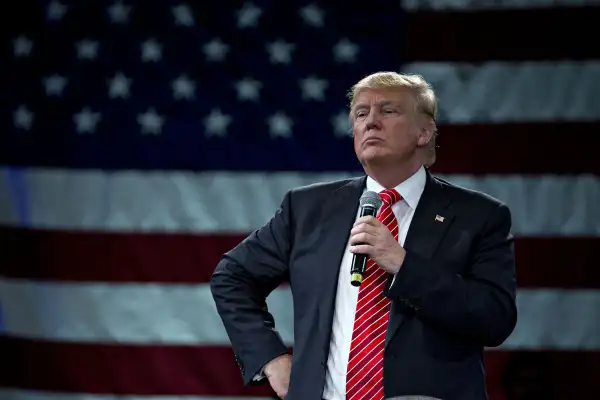How Would Trump's Proposed Tariffs Affect Your Wallet?

Here’s a quiz: A U.S. recession will (a) come if Donald Trump is elected, (b) come if Donald Trump is not elected, (c) come soon whether or not Donald Trump is elected, or (d) is already here. If you answered “All of the above,” please don’t cash out your IRA. Instead turn off cable news and the internet for three days and do some yoga.
If you answered “None of the above,” then you are much calmer than almost everyone commenting on the political race. But don’t get too calm.
With a Trump victory in the GOP race now a clear possibility, everyone is pulling out the grim economic forecasts. On Saturday, Trump told the Washington Post that “we’re sitting on an economic bubble,” and headed for a “very massive recession” (not clear whether “very massive” is bigger than “yuge,” but that’s pretty serious). He also came close to saying that we’re already in one, claiming that the real unemployment rate is close to 20%.
Meanwhile, other folks, too have been warning of recession ... if Trump gets elected. Last week, Moody’s did an analysis of Trump’s tariff plan—45% duties on goods shipped from China, 35% on those brought in from Mexico—that calculated that tariff would swing the U.S. into recession and almost immediately put four million workers out of jobs. On Friday, the U.S. Chamber of Commerce weighed in, turning around Trump’s slogan and asking, “Does a recession sound ‘great’ to you?”
So which is it? Are we hurtling toward a recession that only Trump can save us from? Well, no, and few economists see one straight ahead. What about a Trump-cession brought on by tariffs? That's closer to the mark, but it’s not clear that Trump’s tariffs would have the immediate recessionary effect the Moody’s analysis foresees. However, there would be a pocket book impact, almost certainly raising prices—and ending up with costs most voters won’t like.
On Trump’s claims, here are the facts: March’s employment numbers were stronger than expected, and the economic situation is good enough that people who had abandoned the job market are headed back in. Wage growth has been touch and go, but has picked up most months. And U.S. markets have held up surprisingly well amid wild gyrations in China. One caveat is that economists are pretty lousy at predicting downturns, but right now most of the folks who think we’re headed toward a crash are looking for your vote or your investment in their gold fund.
On the other hand: The Moody’s analysis makes one major questionable assumption. As Jim Tankersley at the Washington Post notes, it counts on China and Mexico to immediately retaliate with yuuuge tariffs of their own. That kind of trade war certainly can happen, but it’s not a foregone conclusion.
One datapoint: The United States has imposed a 25% tariff on light trucks for many years. Not quite a Trumpian level, but in the ballpark. And China has high tariffs on many categories of imported cars. The damage from those has been confined, and those tariffs haven’t made either country seal the border to trade.
But here’s one real-world effect of tariffs that’s clear: Tariffs don’t just keep foreign companies from bringing foreign products into the U.S. They also keep U.S. manufacturers from bringing in parts they need to build stuff. And they stop U.S. companies from bringing in products that are made largely out of U.S. parts.
Says Robert Z. Lawrence, a Harvard economist who studies international trade: “Products today are made in the world. They are not made in any single country.” Two thirds of trade, says Lawrence, is in capital goods and “intermediate inputs” (in other word, parts and components). Lawrence points to iconic U.S, products like Boeing’s 787 Dreamliner and Apple’s iPhone as examples. Most of the value of an iPhone, says Lawrence, is actually created in the U.S.—for instance, the iPhone’s central processor is made by Samsung in Texas. So taxing that would mean taxing a product made largely in this country.
READ ALSO: No, the Stock Market Won’t Crash if Trump Is Elected President
That means tariffs of the kind that Donald Trump advocates have a couple of clear implications for your wallet. This is the part you probably won’t like:
First, the tariffs hit not just Chinese and Mexican manufacturers, but American ones too. A 45% tariff on phones brought in from China hits U.S. parts producers and designers. And a 35% tariff on Mexican imports also affects auto parts that go into ... yes, cars made in the United States, like the Ford Expedition SUV. The result? Prices go up across the board, even if you've been trying to "buy American." (Incidentally, curious about the car that uses the most U.S. made parts? It’s the Toyota Camry.) You can argue that the U.S. should never have made the Mexican border quite as porous to trade as it did with NAFTA, but slapping on punitive tariffs now would clearly have a dramatic effect on prices.
Second, the money you pay in higher prices gets redistributed very inefficiently. Tariffs work a lot like a tax, just disguised in the form of higher prices. The revenue from that tax gets split up between the government (which collects the tariffs), the worker, and a few U.S. companies that get insulated from competition. In effect, Trump-style tariffs would make every person buying an air conditioner in Georgia hand over some money to factory workers and owners in Indiana. Actually, a lot of money: The likelihood is that, on balance, consumers will pay hundreds of thousands of dollars extra for each job preserved.
That's a fine deal for a few people in troubled industries, but there are cheaper ways of getting those people working. For the rest, not so much. Whether or not they cause a "recession," the bottom line on Trump's tariff is that they will probably make you feel poorer.
